- Home
- J. R. R. Tolkien
The Return of the King Page 11
The Return of the King Read online
Page 11
and made a fire there and burned the carcase of the beast; but for Snowmane they dug a grave and set up a stone upon which was carved in the tongues of Gondor and the Mark:
Faithful servant yet master's bane
Lightfoot's foal, swift Snowmane.
Green and long grew the grass on Snowmane's Howe, but ever black and bare was the ground where the beast was burned.
Now slowly and sadly Merry walked beside the bearers, and he gave no more heed to the battle. He was weary and full of pain, and his limbs trembled as with a chill. A great rain came out of the Sea, and it seemed that all things wept for Théoden and Éowyn, quenching the fires in the City with grey tears. It was through a mist that presently he saw the van of the men of Gondor approaching. Imrahil, Prince of Dol Amroth, rode up and drew rein before them.
'What burden do you bear, Men of Rohan?' he cried.
'Théoden King,' they answered. 'He is dead. But Éomer King now rides in the battle: he with the white crest in the wind.'
Then the prince went from his horse, and knelt by the bier in honour of the king and his great onset; and he wept. And rising he looked then on Éowyn and was amazed. 'Surely, here is a woman?' he said. 'Have even the women of the Rohirrim come to war in our need?'
'Nay! One only,' they answered. 'The Lady Éowyn is she, sister of Éomer; and we knew naught of her riding until this hour, and greatly we rue it.'
Then the prince seeing her beauty, though her face was pale and cold, touched her hand as he bent to look more closely on her. 'Men of Rohan!' he cried. 'Are there no leeches among you? She is hurt to the death maybe, but I deem that she yet lives.' And he held the bright-burnished vambrace that was upon his arm before her cold tips, and behold! a little mist was laid on it hardly to be seen.
'Haste now is needed,' he said, and he sent one riding back swiftly to the City to bring aid. But he bowing low to the fallen, bade them farewell, and mounting rode away into battle.
And now the fighting waxed furious on the fields of the Pelennor; and the din of arms rose upon high, with the crying of men and the neighing of horses. Horns were blown and trumpets were braying, and the mumakil were bellowing as they were goaded to war. Under the south walls of the City the footmen of Gondor now drove against the legions of Morgul that were still gathered there in strength. But the horsemen rode eastward to the succour of Éomer: Hurin the Tall Warden of the Keys, and the Lord of Lossarnach, and Hirluin of the Green Hills, and Prince Imrahil the fair with his knights all about him.
Not too soon came their aid to the Rohirrim; for fortune had turned against Éomer, and his fury had betrayed him. The great wrath of his onset had utterly overthrown the front of his enemies, and great wedges of his Riders had passed clear through the ranks of the Southrons, discomfiting their horsemen and riding their footmen to ruin. But wherever the mumakil came there the horses would not go, but blenched and swerved away; and the great monsters were unfought, and stood like towers of defence, and the Haradrim rallied about them. And if the Rohirrim at their onset were thrice outnumbered by the Haradrim alone, soon their case became worse; for new strength came now streaming to the field out of Osgiliath. There they had been mustered for the sack of the City and the rape of Gondor, waiting on the call of their Captain. He now was destroyed; but Gothmog the lieutenant of Morgul had flung them into the fray; Easterlings with axes, and Variags of Khand. Southrons in scarlet, and out of Far Harad black men like half-trolls with white eyes and red tongues. Some now hastened up behind the Rohirrim, others held westward to hold off the forces of Gondor and prevent their joining with Rohan.
It was even as the day thus began to turn against Gondor and their hope wavered that a new cry went up in the City, it being then midmorning, and a great wind blowing, and the rain flying north, and the sun shining. In that clear air watchmen on the walls saw afar a new sight of fear, and their last hope left them.
For Anduin, from the bend at the Harlond, so flowed that from the City men could look down it lengthwise for some leagues, and the far-sighted could see any ships that approached. And looking thither they cried in dismay; for black against the glittering stream they beheld a fleet borne up on the wind: dromunds, and ships of great draught with many oars, and with black sails bellying in the breeze.
'The Corsairs of Umbar!' men shouted. 'The Corsairs of Umbar! Look! The Corsairs of Umbar are coming! So Belfalas is taken, and the Ethir, and Lebennin is gone. The Corsairs are upon us! It is the last stroke of doom!'
And some without order, for none could he found to command them in the City, ran to the bells and tolled the alarm; and some blew the trumpets sounding the retreat. 'Back to the walls!' they cried. 'Back to the walls! Come back to the City before all are overwhelmed!' But the wind that sped the ships blew all their clamour away.
The Rohirrim indeed had no need of news or alarm. All too well they could see for themselves the black sails. For Éomer was now scarcely a mile from the Harlond, and a great press of his first foes was between him and the haven there, while new foes came swirling behind, cutting him off from the Prince. Now he looked to the River, and hope died in his heart, and the wind that he had blessed he now called accursed. But the hosts of Mordor were enheartened, and filled with a new lust and fury they came yelling to the onset.
Stern now was Éomer's mood, and his mind clear again. He let blow the horns to rally all men to his banner that could come thither; for he thought to make a great shield-wall at the last, and stand, and fight there on foot till all fell, and do deeds of song on the fields of Pelennor, though no man should be left in the West to remember the last King of the Mark. So he rode to a green hillock and there set his banner, and the White Horse ran rippling in the wind.
Out of doubt, out of dark to the day's rising
I came singing in the sun, sword unsheathing.
To hope's end I rode and to heart's breaking:
Now for wrath, now for ruin and a red nightfall!
These staves he spoke, yet he laughed as he said them. For once more lust of battle was on him; and he was still unscathed, and he was young, and he was king: the lord of a fell people. And lo! even as he laughed at despair he looked out again on the black ships, and he lifted up his sword to defy them.
And then wonder took him, and a great joy; and he cast his sword up in the sunlight and sang as he caught it. And all eyes followed his gaze, and behold! upon the foremost ship a great standard broke, and the wind displayed it as she turned towards the Harlond. There flowered a White Tree, and that was for Gondor; but Seven Stars were about it, and a high crown above it, the signs of Elendil that no lord had borne for years beyond count. And the stars flamed in the sunlight, for they were wrought of gems by Arwen daughter of Elrond; and the crown was bright in the morning, for it was wrought of mithril and gold.
Thus came Aragorn son of Arathorn, Elessar, Isildur's heir, out of the Paths of the Dead, borne upon a wind from the Sea to the kingdom of Gondor; and the mirth of the Rohirrim was a torrent of laughter and a flashing of swords, and the joy and wonder of the City was a music of trumpets and a ringing of bells. But the hosts of Mordor were seized with bewilderment, and a great wizardry it seemed to them that their own ships should be filled with their foes; and a black dread fell on them, knowing that the tides of fate had turned against them and their doom was at hand.
East rode the knights of Dol Amroth driving the enemy before them: troll-men and Variags and orcs that hated the sunlight. South strode Éomer and men fled before his face, and they were caught between the hammer and the anvil. For now men leaped from the ships to the quays of the Harlond and swept north like a storm. There came Legolas, and Gimli wielding his axe, and Halbarad with the standard, and Elladan and Elrohir with stars on their brow, and the dour-handed Dunedain, Rangers of the North, leading a great valour of the folk of Lebennin and Lamedon and the fiefs of the South. But before all went Aragorn with the Flame of the West, Anduril like a new fire kindled, Narsil re-forged as deadly as of old: and upon his
brow was the Star of Elendil.
And so at length Éomer and Aragorn met in the midst of the battle, and they leaned on their swords and looked on one another and were glad.
'Thus we meet again, though all the hosts of Mordor lay between us,' said Aragorn. 'Did I not say so at the Hornburg?'
'So you spoke,' said Éomer, 'but hope oft deceives, and I knew not then that you were a man foresighted. Yet twice blessed is help unlooked for, and never was a meeting of friends more joyful.' And they clasped hand in hand. 'Nor indeed more timely,' said Éomer. 'You come none too soon, my friend. Much loss and sorrow has befallen us.'
'Then let us avenge it, ere we speak of it!' said Aragorn, and they rode back to battle together.
Hard fighting and long labour they had still; for the Southrons were bold men and grim, and fierce in despair; and the Easterlings were strong and war-hardened and asked for no quarter. And so in this place and that, by burned homestead or barn, upon hillock or mound, under wall or on field, still they gathered and rallied and fought until the day wore away.
Then the Sun went at last behind Mindolluin and filled all the sky with a great burning, so that the hills and the mountains were dyed as with blood; fire glowed in the River, and the grass of the Pelennor lay red in the nightfall. And in that hour the great Battle of the field of Gondor was over; and not one living foe was left within the circuit of the Rammas. All were slain save those who fled to die, or to drown in the red foam of the River. Few ever came eastward to Morgul or Mordor; and to the land of the Haradrim came only a tale from far off: a rumour of the wrath and terror of Gondor.
Aragorn and Éomer and Imrahil rode back towards the Gate of the City, and they were now weary beyond joy or sorrow. These three were unscathed, for such was their fortune and the skill and might of their arms, and few indeed had dared to abide them or look on their faces in the hour of their wrath. But many others were hurt or maimed or dead upon the field. The axes hewed Forlong as he fought alone and unhorsed; and both Duilin of Morthond and his brother were trampled to death when they assailed the mumakil, leading their bowmen close to shoot at the eyes of the monsters. Neither Hirluin the fair would return to Pinnath Gelin, nor Grimbold to Grimslade, nor Halbarad to the Northlands, dour-handed Ranger. No few had fallen, renowned or nameless, captain or soldier; for it was a great battle and the full count of it no tale has told. So long afterward a maker in Rohan said in his song of the Mounds of Mundburg:
We heard of the horns in the hills ringing,
the swords shining in the South-kingdom.
Steeds went striding to the Stoningland
as wind in the morning. War was kindled.
There Théoden fell, Thengling mighty,
to his golden halls and green pastures
in the Northern fields never returning,
high lord of the host. Harding and Guthláf
Dunhere and Deorwine, doughty Grimbold,
Herefara and Herubrand, Horn and Fastred,
fought and fell there in a far country:
in the Mounds of Mundburg under mould they lie
with their league-fellows, lords of Gondor.
Neither Hirluin the Fair to the hills by the sea,
nor Forlong the old to the flowering vales
ever, to Arnach, to his own country
returned in triumph; nor the tall bowmen,
Derufin and Duilin, to their dark waters,
meres of Morthond under mountain-shadows.
Death in the morning and at day's ending
lords took and lowly. Long now they sleep
under grass in Gondor by the Great River.
Grey now as tears, gleaming silver,
red then it rolled, roaring water:
foam dyed with blood flamed at sunset;
as beacons mountains burned at evening;
red fell the dew in Rammas Echor.
Chapter 7
The Pyre of Denethor
When the dark shadow at the Gate withdrew Gandalf still sat motionless. But Pippin rose to his feet, as if a great weight had been lifted from him; and he stood listening to the horns, and it seemed to him that they would break his heart with joy. And never in after years could he hear a horn blown in the distance without tears starting in his eyes. But now suddenly his errand returned to his memory, and he ran forward. At that moment Gandalf stirred and spoke to Shadowfax, and was about to ride through the Gate.
'Gandalf, Gandalf!' cried Pippin, and Shadowfax halted.
'What are you doing here?' said Gandalf. 'Is it not a law in the City that those who wear the black and silver must stay in the Citadel, unless their lord gives them leave?'
'He has,' said Pippin. 'He sent me away. But I am frightened. Something terrible may happen up there. The Lord is out of his mind, I think. I am afraid he will kill himself, and kill Faramir too. Can't you do something?'
Gandalf looked through the gaping Gate, and already on the fields he heard the gathering sound of battle. He clenched his hand. 'I must go,' he said. 'The Black Rider is abroad, and he will yet bring ruin on us. I have no time.'
'But Faramir!' cried Pippin. 'He is not dead, and they will burn him alive, if someone does not stop them.'
'Burn him alive?' said Gandalf. 'What is this tale? Be quick!'
'Denethor has gone to the Tombs,' said Pippin, 'and he has taken Faramir, and he says we are all to burn, and he will not wait, and they are to make a pyre and burn him on it, and Faramir as well. And he has sent men to fetch wood and oil. And I have told Beregond, but I'm afraid he won't dare to leave his post: he is on guard. And what can he do anyway?' So Pippin poured out his tale, reaching up and touching Gandalf's knee with trembling hands. 'Can't you save Faramir?'
'Maybe I can,' said Gandalf, 'but if I do, then others will die, I fear. Well, I must come, since no other help can reach him. But evil and sorrow will come of this. Even in the heart of our stronghold the Enemy has power to strike us: for his will it is that is at work.'
Then having made up his mind he acted swiftly; and catching up Pippin and setting him before him, he turned Shadowfax with a word. Up the climbing streets of Minas Tirith they clattered, while the noise of war rose behind them. Everywhere men were rising from their despair and dread, seizing their weapons, crying one to another: 'Rohan has come!' Captains were shouting, companies were mustering; many already were marching down to the Gate.
They met the Prince Imrahil, and he called to them: 'Whither now, Mithrandir? The Rohirrim are fighting on the fields of Gondor! We must gather all the strength that we can find.'
'You will need every man and more,' said Gandalf. 'Make all haste. I will come when I can. But I have an errand to the Lord Denethor that will not wait. Take command in the Lord's absence!'
They passed on; and as they climbed and drew near to the Citadel they felt the wind blowing in their faces, and they caught the glimmer of morning far away, a light growing in the southern sky. But it brought little hope to them, not knowing what evil lay before them, fearing to come too late.
'Darkness is passing,' said Gandalf, 'but it still lies heavy on this City.'
At the gate of the Citadel they found no guard. 'Then Beregond has gone,' said Pippin more hopefully. They turned away and hastened along the road to the Closed Door. It stood wide open, and the porter lay before it. He was slain and his key had been taken.
'Work of the Enemy!' said Gandalf. 'Such deeds he loves: friend at war with friend; loyalty divided in confusion of hearts.' Now he dismounted and bade Shadowfax return to his stable. 'For, my friend,' he said, 'you and I should have ridden to the fields long ago, but other matters delay me. Yet come swiftly if I call!'
They passed the Door and walked on down the steep winding road. Light was growing, and the tall columns and carven figures beside the way went slowly by like grey ghosts.
Suddenly the silence was broken, and they heard below them cries and the ringing of swords: such sounds as had not been heard in the hallowed places since the buildin
g of the City. At last they came to Rath Dínen and hastened towards the House of the Stewards, looming in the twilight under its great dome.
'Stay! Stay!' cried Gandalf, springing forward to the stone stair before the door. 'Stay this madness!'
For there were the servants of Denethor with swords and torches in their hands; but alone in the porch upon the topmost step stood Beregond, clad in the black and silver of the Guard; and he held the door against them. Two of them had already fallen to his sword, staining the hallows with their blood; and the others cursed him, calling him outlaw and traitor to his master.
Even as Gandalf and Pippin ran forward, they heard from within the house of the dead the voice of Denethor crying: 'Haste, haste! Do as I have bidden! Slay me this renegade! Or must I do so myself?' Thereupon the door which Beregond held shut with his left hand was wrenched open, and there behind him stood the Lord of the City, tall and fell; a light like flame was in his eyes, and he held a drawn sword.
But Gandalf sprang up the steps, and the men fell back from him and covered their eyes; for his coming was like the incoming of a white light into a dark place, and he came with great anger. He lifted up his hand, and in the very stroke, the sword of Denethor flew up and left his grasp and fell behind him in the shadows of the house; and Denethor stepped backward before Gandalf as one amazed.
'What is this, my lord?' said the wizard. 'The houses of the dead are no places for the living. And why do men fight here in the Hallows when there is war enough before the Gate? Or has our Enemy come even to Rath Dínen?'
'Since when has the Lord of Gondor been answerable to thee?' said Denethor. 'Or may I not command my own servants?'
'You may,' said Gandalf. 'But others may contest your will, when it is turned to madness and evil. Where is your son, Faramir?'
'He lies within,' said Denethor, 'burning, already burning. They have set a fire in his flesh. But soon all shall be burned. The West has failed. It shall all go up in a great fire, and all shall be ended. Ash! Ash and smoke blown away on the wind!'
Then Gandalf seeing the madness that was on him feared that he had already done some evil deed, and he thrust forward, with Beregond and Pippin behind him, while Denethor gave back until he stood beside the table within. But there they found Faramir, still dreaming in his fever, lying upon the table. Wood was piled under it, and high all about it, and all was drenched with oil, even the garments of Faramir and the coverlets; but as yet no fire had been set to the fuel. Then Gandalf revealed the strength that lay hid in him; even as the light of his power was hidden under his grey mantle. He leaped up on to the faggots, and raising the sick man lightly he sprang down again, and bore him towards the door. But as he did so Faramir moaned and called on his father in his dream.
Denethor started as one waking from a trance, and the flame died in his eyes, and he wept; and he said: 'Do not take my son from me! He calls for me.'
'He calls,' said Gandalf, 'but you cannot come to him yet. For he must seek healing on the threshold of death, and maybe find it not. Whereas your part is to go out to the battle of your City, where maybe death awaits you. This you know in your heart.'
'He will not wake again,' said Denethor. 'Battle is vain. Why should we wish to live longer? Why should we not go to death side by side?'
'Authority is not given to you, Steward of Gondor, to order the hour of your death,' answered Gandalf. 'And only the heathen kings, under the domination of the Dark Power, did thus, slaying themselves in pride and despair, murdering their kin to ease their own death.' Then passing through the door he took Faramir from the deadly house and laid him on the bier on which he had been brought, and which had now been set in the porch. Denethor followed him, and stood trembling, looking with longing on the face of his son. And for a moment, while all were silent and still, watching the Lord in his throes, he wavered.
'Come!' said Gandalf. 'We are needed. There is much that you can yet do.'
Then suddenly Denethor laughed. He stood up tall and proud again, and stepping swiftly back to the table he lifted from it the pillow on which his head had lain. Then coming to the doorway he drew aside the covering, and lo! he had between his hands a palantír. And as he held it up, it seemed to those that looked on that the globe began to glow with an inner flame, so that the lean face of the Lord was lit as with a red fire, and it seemed cut out of hard stone, sharp with black shadows, noble, proud, and terrible. His eyes glittered.
'Pride and despair!' he cried. 'Didst thou think that the eyes of the White Tower were blind? Nay, I have seen more than thou knowest, Grey Fool. For thy hope is but ignorance. Go then and labour in healing! Go forth and fight! Vanity. For a little space you may triumph on the field, for a day. But against the Power that now arises there is no victory. To this City only the first finger of its hand has yet been stretched. All the East is moving. And even now the wind of thy hope cheats thee and wafts up Anduin a fleet with black sails. The West has failed. It is time for all to depart who would not be slaves.'
'Such counsels will make the Enemy's victory certain indeed,' said Gandalf.
'Hope on then!' laughed Denethor. 'Do I not know thee, Mithrandir? Thy hope is to rule in my stead, to stand behind every throne, north, south, or west. I have read thy mind and its policies. Do I not know that you commanded this halfling here to keep silence? That you brought him hither to be a spy within my very chamber? And yet in our speech together I have learned the names and purpose of all thy companions. So! With the left hand thou wouldst use me for a little while as a shield against Mordor, and with the right bring up this Ranger of the North to supplant me.
'But I say to thee, Gandalf Mithrandir, I will not be thy tool! I am Steward of the House of Anárion. I will not step down to be the dotard chamberlain of an upstart. Even were his claim proved to me, still he comes but of the line of Isildur. I will not bow to such a one, last of a ragged house long bereft of lordship and dignity.'

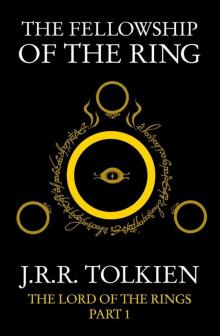 The Fellowship of the Ring
The Fellowship of the Ring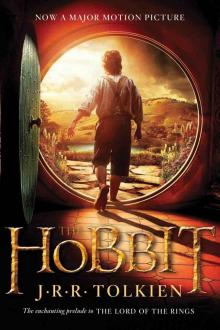 The Hobbit
The Hobbit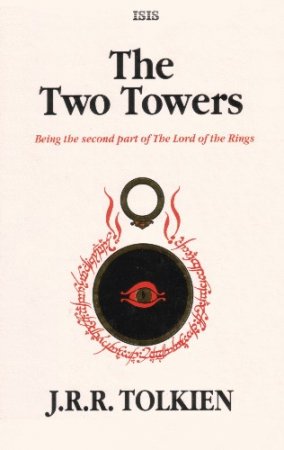 The Two Towers
The Two Towers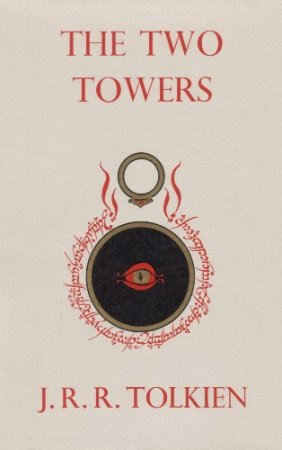 The Return of the King
The Return of the King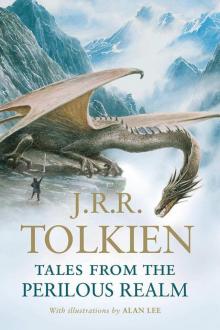 Tales From the Perilous Realm
Tales From the Perilous Realm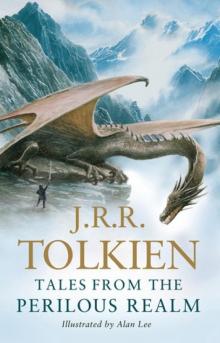 Leaf by Niggle
Leaf by Niggle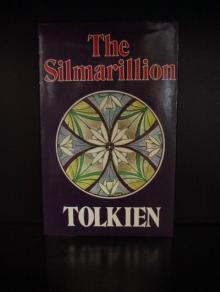 The Silmarillon
The Silmarillon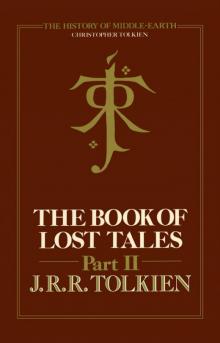 The Book of Lost Tales, Part Two
The Book of Lost Tales, Part Two The Book of Lost Tales, Part One
The Book of Lost Tales, Part One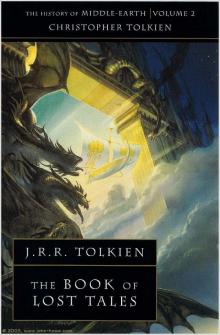 The Book of Lost Tales 2
The Book of Lost Tales 2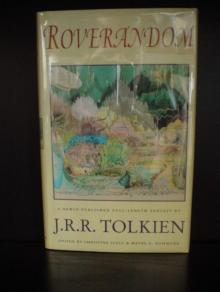 Roverandom
Roverandom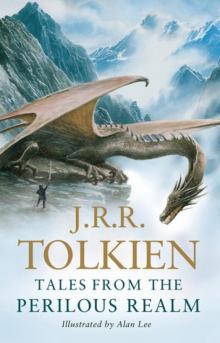 Smith of Wootton Major
Smith of Wootton Major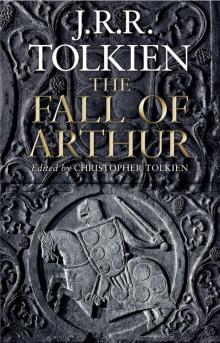 The Fall of Arthur
The Fall of Arthur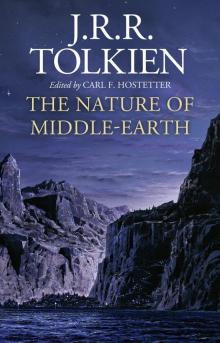 The Nature of Middle-earth
The Nature of Middle-earth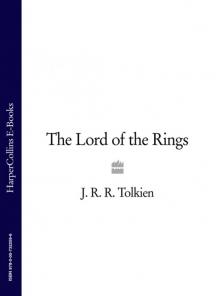 The Lord of the Rings: The Fellowship of the Ring, The Two Towers, The Return of the King
The Lord of the Rings: The Fellowship of the Ring, The Two Towers, The Return of the King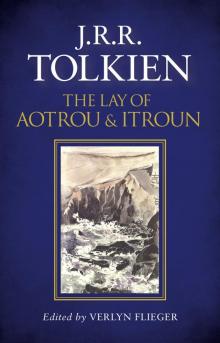 The Lay of Aotrou and Itroun
The Lay of Aotrou and Itroun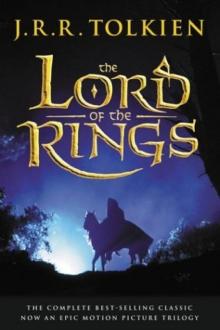 lord_rings.qxd
lord_rings.qxd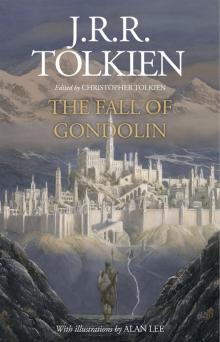 The Fall of Gondolin
The Fall of Gondolin The Book of Lost Tales, Part 1
The Book of Lost Tales, Part 1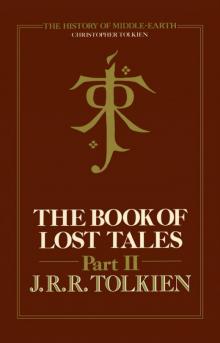 The Book of Lost Tales, Part 2
The Book of Lost Tales, Part 2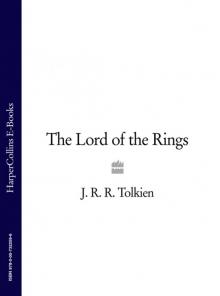 The Lord of the Rings
The Lord of the Rings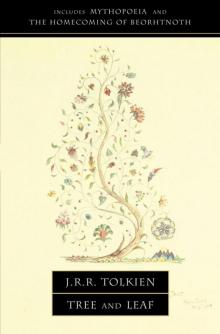 Tree and Leaf
Tree and Leaf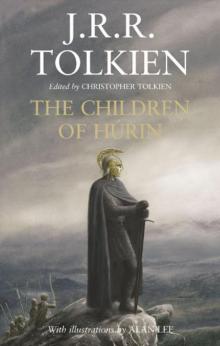 The Children of Húrin
The Children of Húrin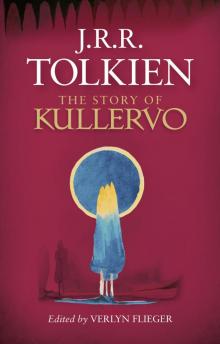 The Story of Kullervo
The Story of Kullervo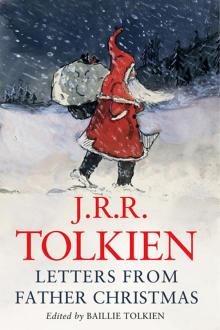 Letters From Father Christmas
Letters From Father Christmas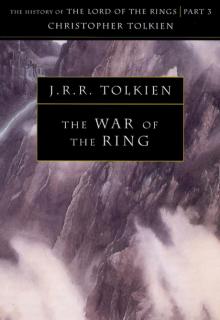 The History of Middle Earth: Volume 8 - The War of the Ring
The History of Middle Earth: Volume 8 - The War of the Ring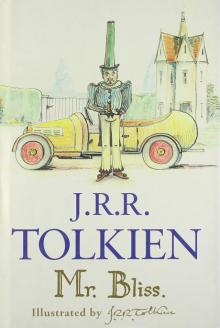 Mr. Bliss
Mr. Bliss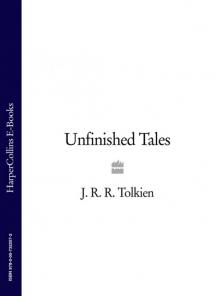 Unfinished Tales
Unfinished Tales The Adventures of Tom Bombadil
The Adventures of Tom Bombadil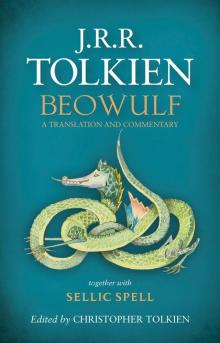 Beowulf: A Translation and Commentary, together with Sellic Spell
Beowulf: A Translation and Commentary, together with Sellic Spell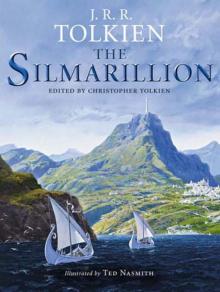 The Silmarillion
The Silmarillion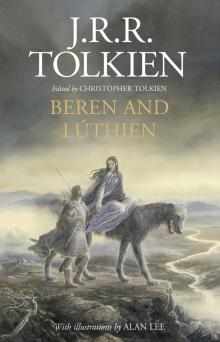 Beren and Lúthien
Beren and Lúthien